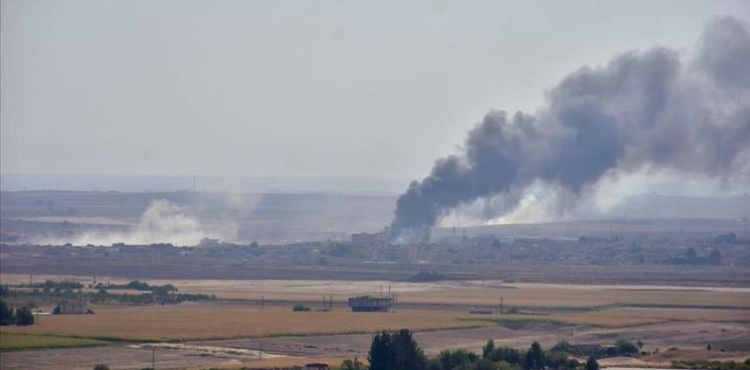Hours after Washington announced a ceasefire agreement, 14 civilians were killed in the Turkish attack in northeastern Syria, according to the Syrian Observatory for Human Rights, in conjunction with the president´s continued threats. Recep Tayyip Erdogan of the Kurdish fighters.
Under an agreement extracted by US Vice President Mike Pence in Ankara, Turkey agreed Thursday to suspend its offensive in northeastern Syria on condition that the YPG withdraw from the border region within five days.
"If the promises are fulfilled until Tuesday evening, the problem of the safe area will be solved. If it fails, the process will start ... the moment the 120 hours expire," Erdogan said on Friday.
Turkey, which fears Kurdish autonomy near its border and provokes separatism, is seeking to create a buffer zone of more than 440 kilometers, the entire border control of the Kurds, and a width of thirty kilometers, to return a large part of its 3.6 million Syrian refugees.
Within nine days of the attack, Turkey and its pro-Syrian factions seized a 120-kilometer wide area between the outskirts of Ras al-Ain (north of al-Hasakah) and the city of Tal Abyad (north of Raqqa), in some areas more than 30 kilometers deep. Analysts predicted that Turkey would be satisfied in the first stage in this region.
The ceasefire on the ground has yet to be reversed, with the Syrian Observatory reporting that 14 civilians have been killed in aerial and artillery shelling of Turkish forces and pro-Syrian factions in a village east of the border town of Ras al-Ain, as well as nine members of the Syrian Democratic Forces.
The Observatory noted that sporadic clashes continued in the city of Ras al-Ain, which is seeking Syrian democratic forces to prevent Turkish forces and factions loyal to complete control.
Syria´s Democratic Forces on Friday accused Turkey of violating the agreement. "Despite the agreement to stop the fighting, aerial and artillery shelling continues to target the positions of fighters, civilians and the hospital in Ras al-Ain," said media officer Mustafa Bali.
The Turkish attack, according to the Syrian Observatory, killed more than 80 civilians and 230 fighters of the SDF.
A number of the wounded arrived at Tal Tamr hospital south of Ras al-Ain, and an AFP photographer saw a man screaming from the pain while healing his feet.
On the Turkish side, the authorities reported during the attack that six Turkish soldiers and 20 civilians were killed in shells they accused Kurdish fighters of firing.
The Turkish offensive began on the ninth of this month, two days after the withdrawal of limited US forces from border points.
Faced with accusations that he abandoned the Kurds, who defeated ISIS with US backing, Trump threatened Turkey with severe sanctions and then sent his deputy Mike Pence to Ankara, his NATO partner, to discuss a ceasefire.
After talks, Pence announced on Thursday evening that "all military operations will be suspended for 120 hours, and the process will stop once the completion of this withdrawal," referring to the YPG.
The agreement provides for the withdrawal of Kurdish forces from an area 32 kilometers deep.
Erdogan repeated on Friday that the area would be 444 kilometers long, adding: "It is not over. The process is underway."
For its part, the SDF announced its readiness to abide by the ceasefire, which it said was related to the area between Ras al-Ain and Tal Abyad, without mentioning the withdrawal of Kurdish units from the border area.
In September, Kurdish fighters announced their withdrawal from some border points near Tall Abyad and Ras al-Ain in implementation of a US-Turkish agreement aimed at preventing Ankara´s attack on the area. But Turkey did not care and accused Washington of stalling, ending up with the attack, which prompted 300,000 people to flee their areas, according to the Syrian Observatory.
Trump, for his part, praised the ceasefire agreement, saying it was "a great day for civilization."
Under the agreement, once the attack is completely halted, Washington will lift the sanctions it intended to impose on Turkey.
European Council President Donald Tusk on Friday criticized the deal, saying it was a "demand for the surrender of the Kurds", reiterating the European Union´s call to stop the attack.
French President Emmanuel Macron announced that he and German Chancellor Angela Merkel and British Foreign Minister Boris Johnson will meet Erdogan.
Several European countries have expressed concern about the repercussions of the attack on the battle against the Islamic State, which is still active in dormant cells despite its field defeat by the Syrian Democratic Forces.
The Kurds found no solution to Washington´s abandonment but to resort to Damascus.
During the past two days, Syrian army units have been deployed in several border areas, most notably the cities of Manbij and Kobani in the northern province of Aleppo, under an agreement between the Kurds and Damascus sponsored by Moscow.
The terms of the agreement remain unclear, with the Kurds insisting that they are "military" only, and do not affect the work of the autonomous institutions they have established after taking control of large areas in the north and northeast of the country after decades of marginalization by successive Syrian governments.












